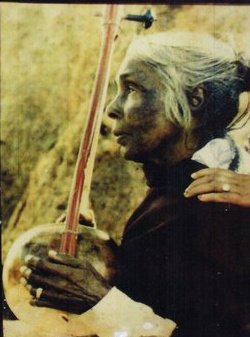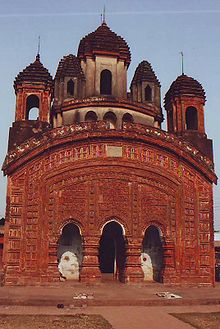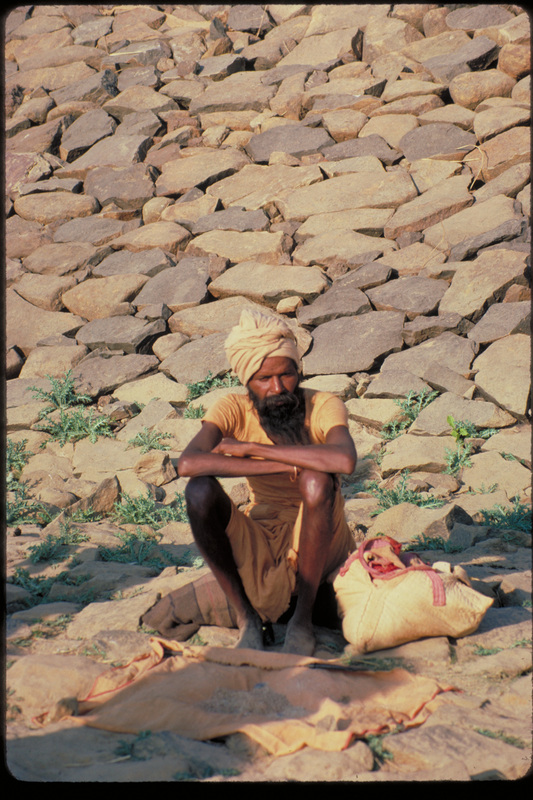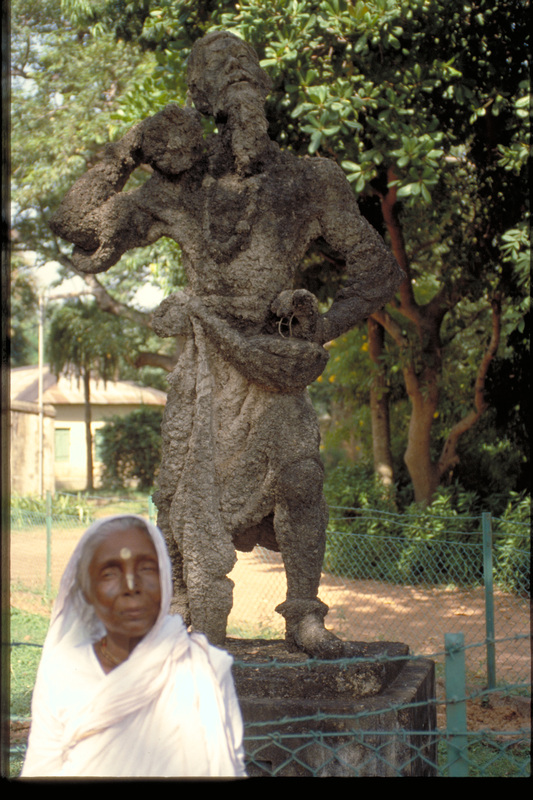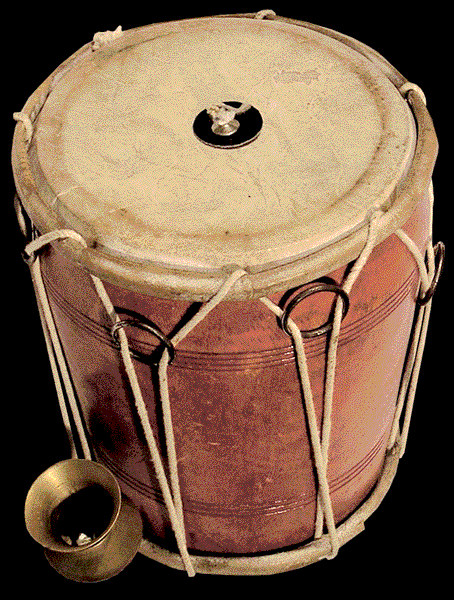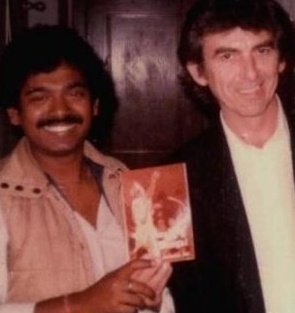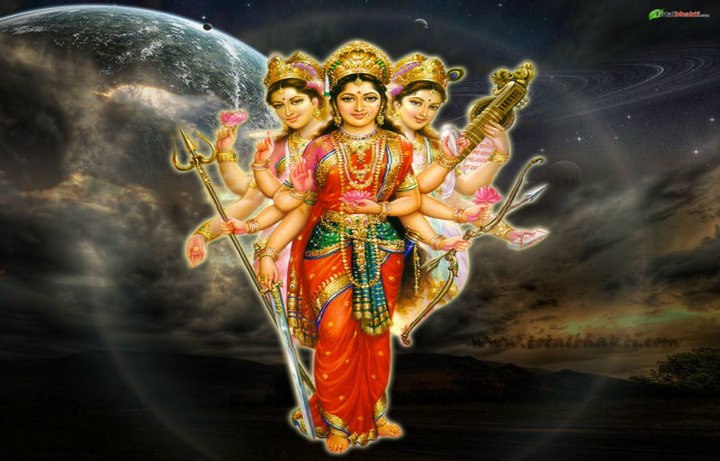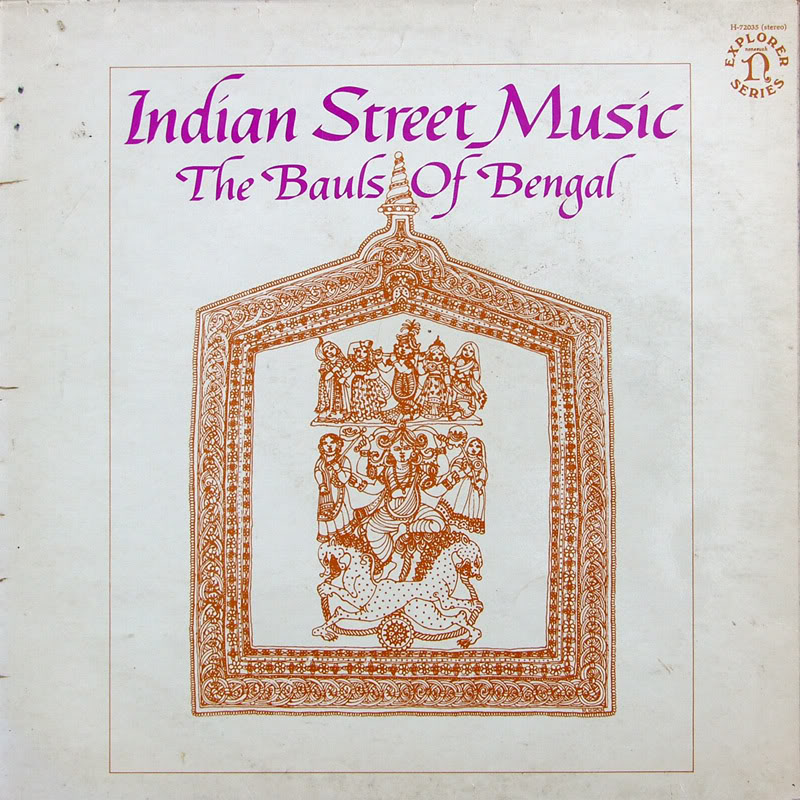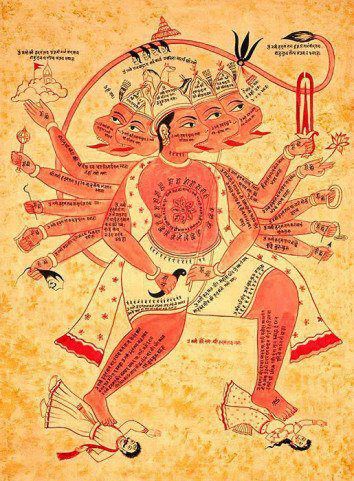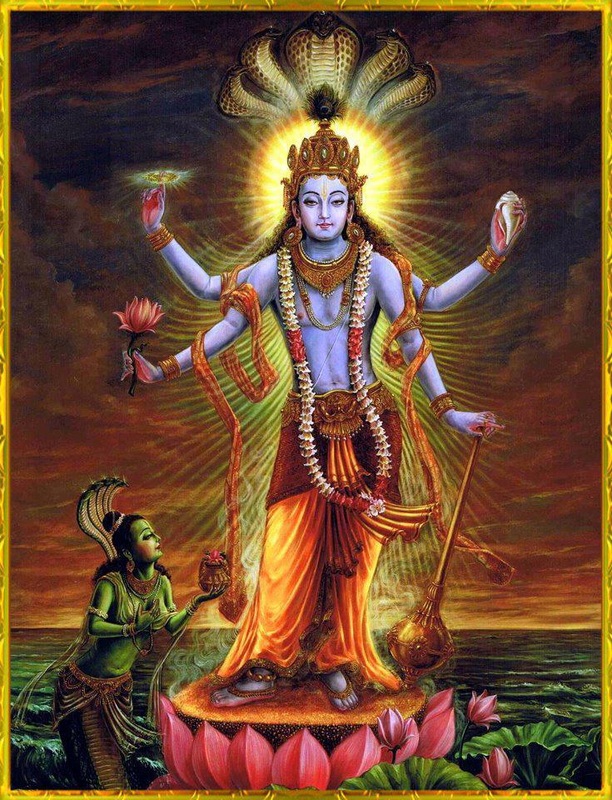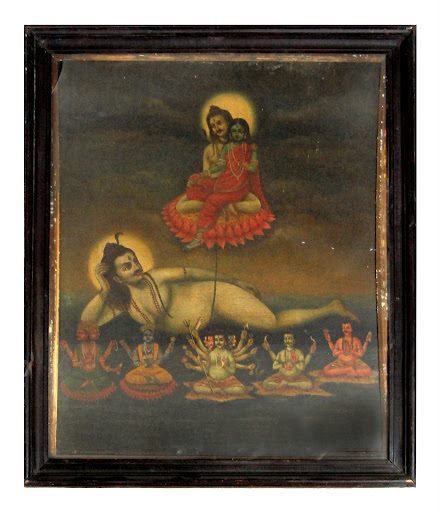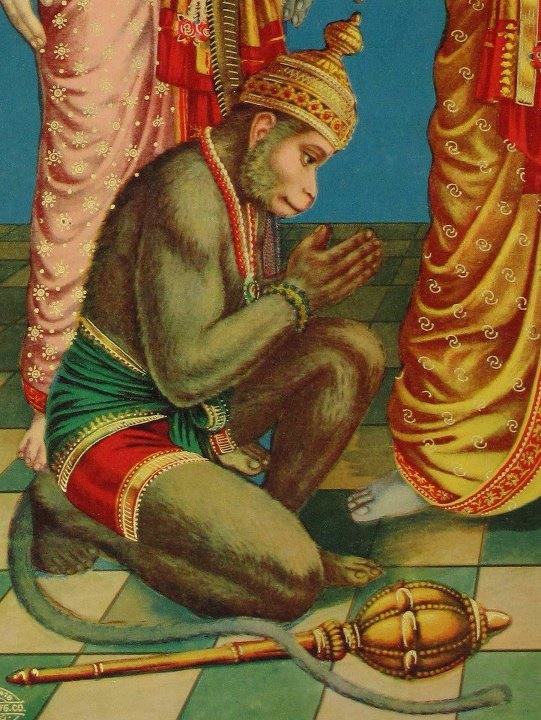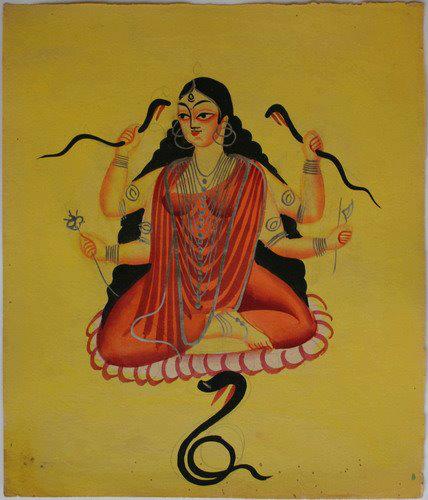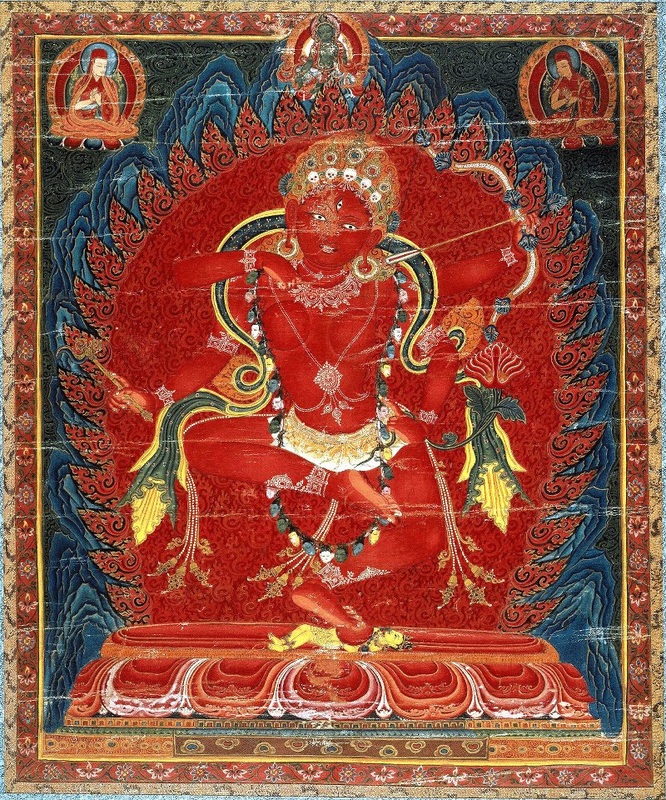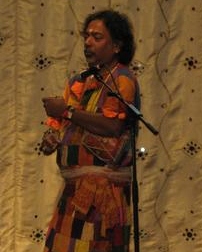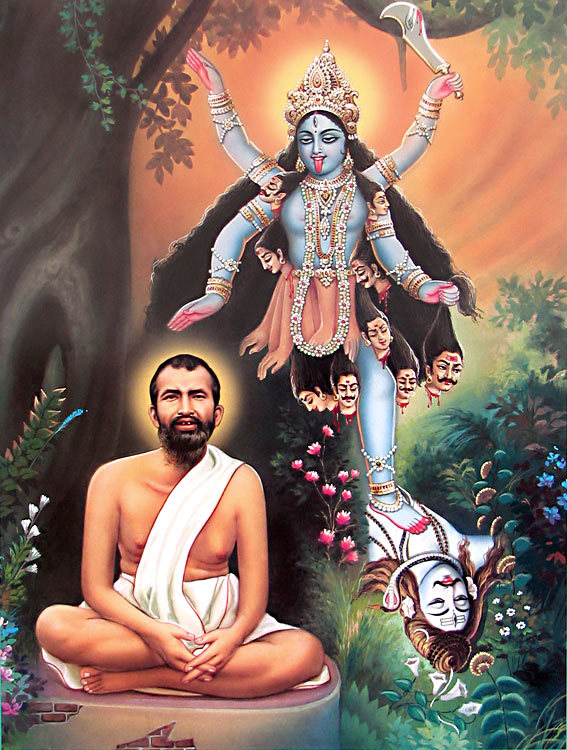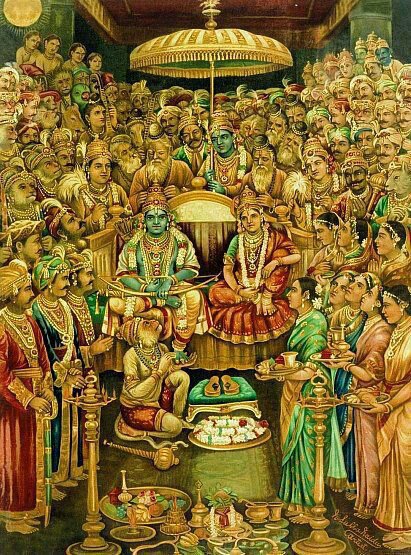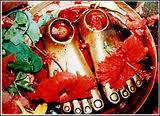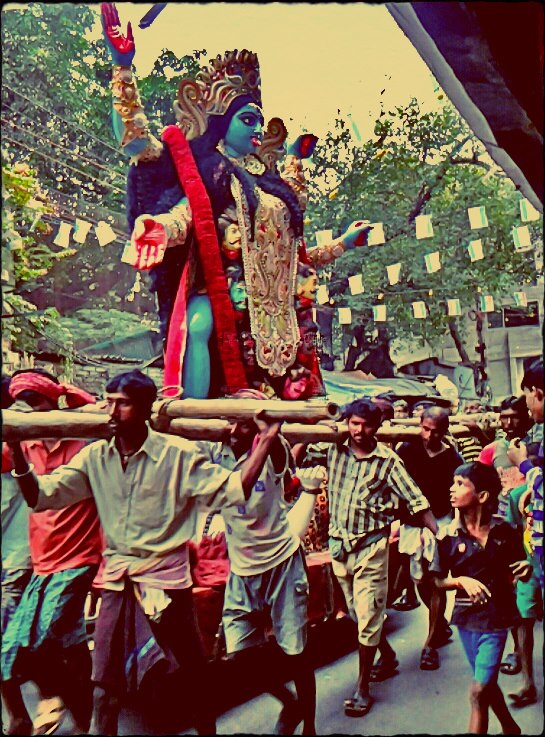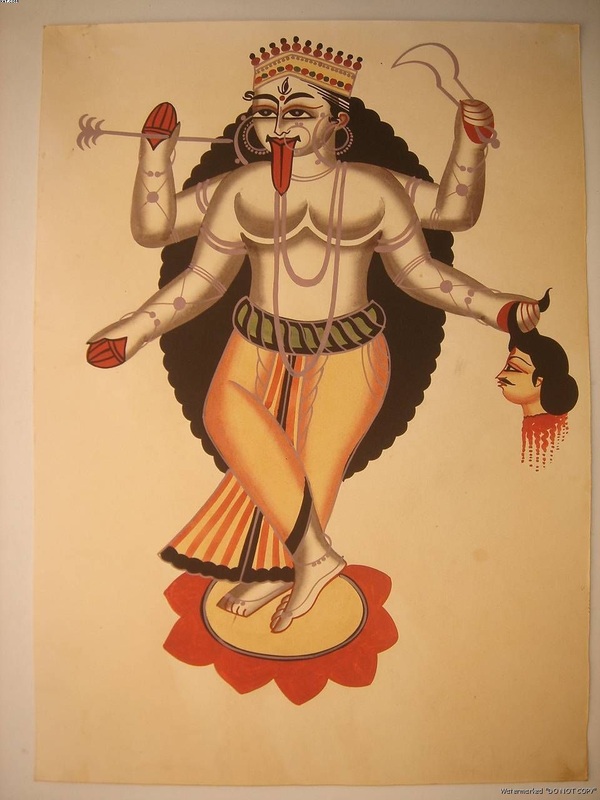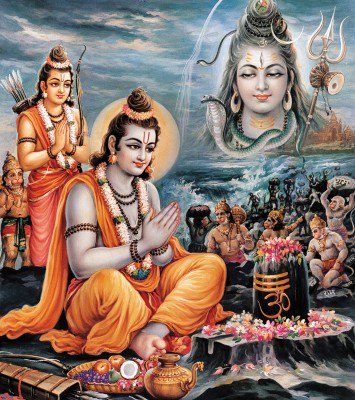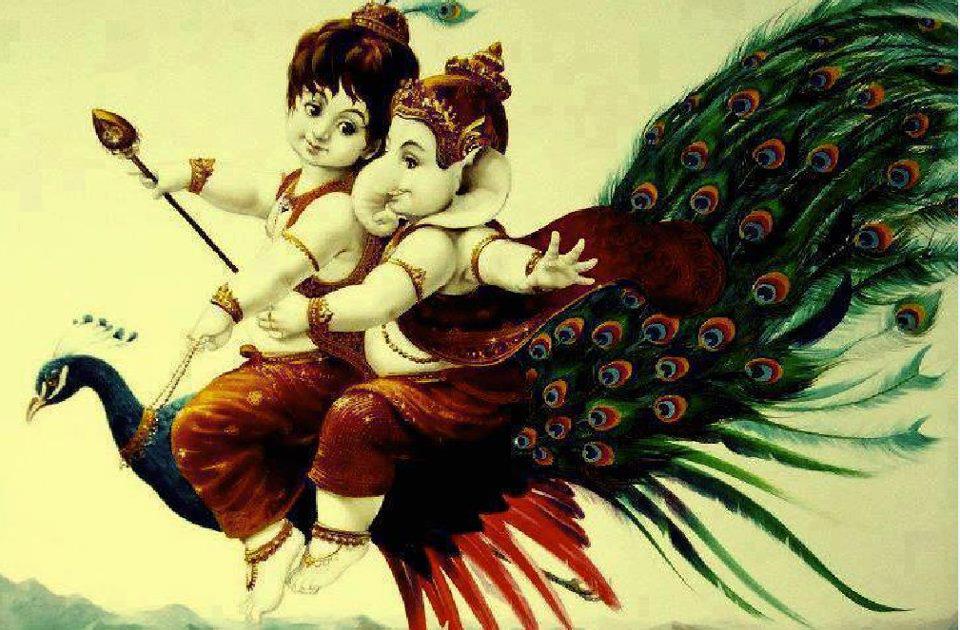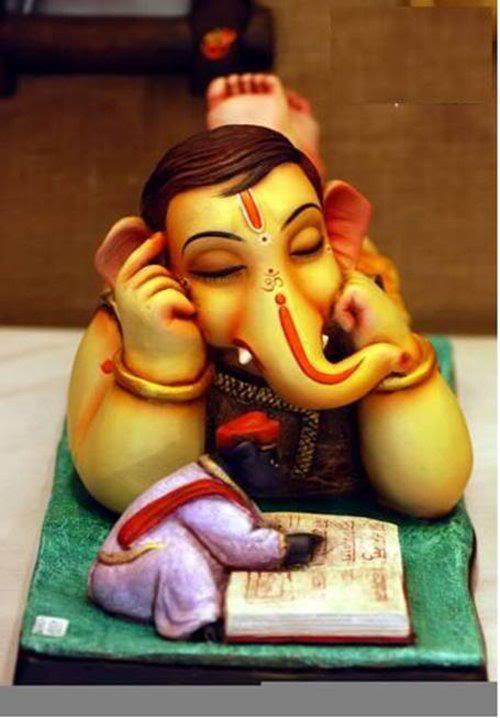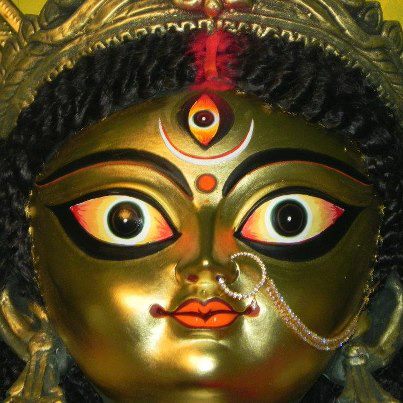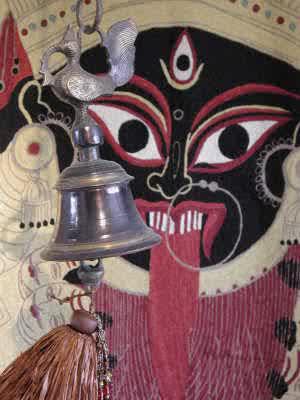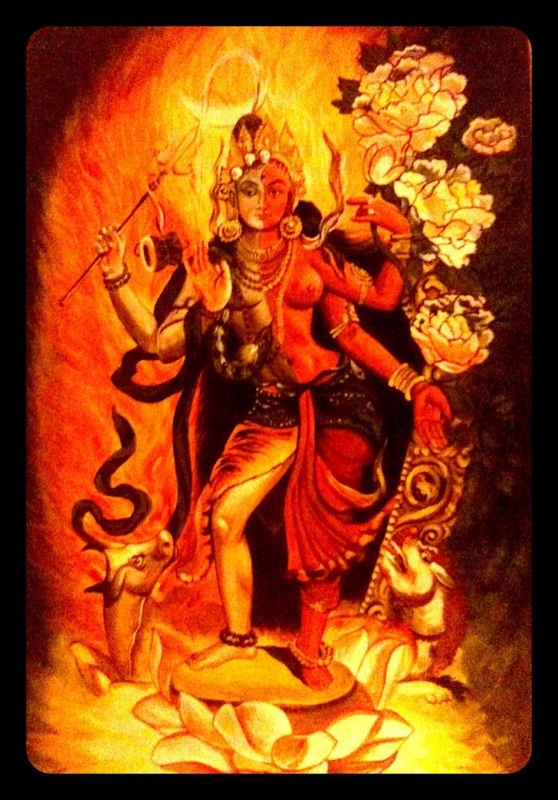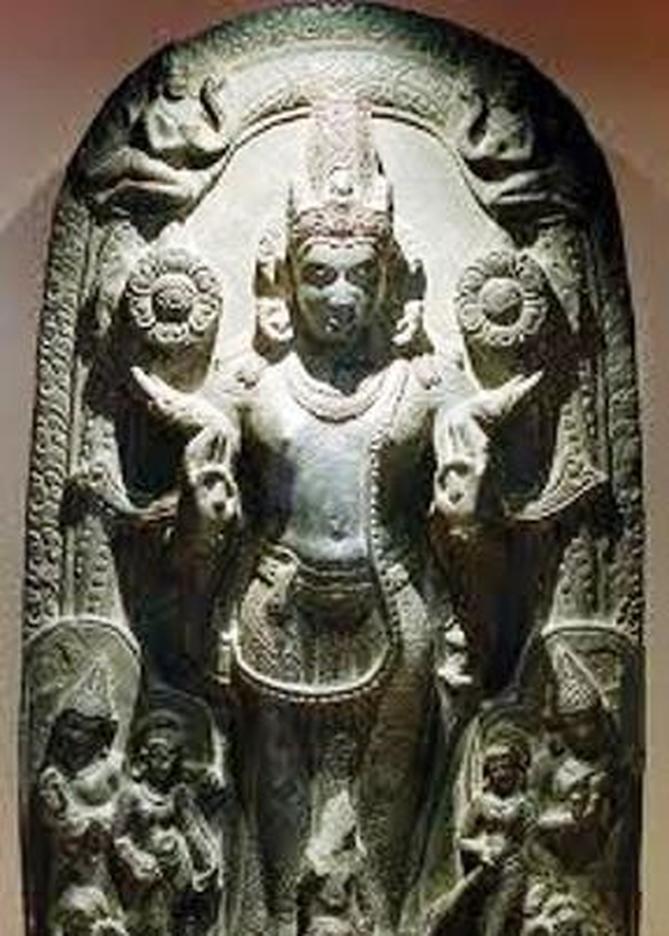
The name of this deity is said to derive from the verb ‘pusyati’ literally meaning ‘cause to thrive’ so his name means one who causes people to thrive. Many hymns are addressed to Pushan and sometimes in connection with Indra. He is praised in eight hymns in the Rig Veda. Some of these hymns appeal to him to guard livestock and find lost livestock. His chariot is pulled by goats. Sometimes he is described as driving the Sun in its course across the sky. He seems to represent the sun as a guardian of flocks and herds.
According to Vishnu Purana, Pushan is one of twelve Aditi’s sons. Aditi is the Mother of the Gods. She represent the boundless heavens and known to be the supporter of the sky, sustainer of the earth and sovereign of the world. There is a general confusion of listing down her children. Originally it was numbered seven but later increased to twelve, to represent the sun in the twelve months of the year. They are Surya, Aryama, Pushan, Tvashta, Savita, Bhaga, Dhata, Vidhata, Varuna, Mitra, Indra, and Lord Vamana. It is said that Aditi cherished the first seven as the eighth was born as a shapeless lump. But that was taken up by the divine artificer and from it molded out Vvasvat. The remaining lump fell to earth and became elephants.
DEPICTION:
Pushan or Pusan is a Vedic solar deity and one of the Adityas. His individuality is vague and his anthropomorphic traits are scanty. He wears braided hair and a beard. He is the god of meeting. Pushan was responsible for marriages, journeys, roads, and the feeding of cattle. He was the conductor of souls to the other world. He protected travelers from bandits and wild beasts, and protected men from being exploited by other men. He was a supportive guide, a "good" god, leading his adherents towards rich pastures and wealth. He carried a golden lance, a symbol of activity and signifying his constant movement. He is seen as riding in a chariot pulled by goats, and is sometimes made a sort of sun god, hauling the sun in its course across the sky. ‘With his golden aerial ships Pusan acts as the messenger of Surya. He moves onward observing the universe, and makes his abode in heaven. He is a guardian who knows and beholds all creatures.
As best of charioteers he drove downward the golden wheel of the sun. He traverses the distant path of heaven and earth; he goes to and returns from both the beloved abodes. He conducts the dead on the far-off path of the Fathers. He is a guardian of roads, removing dangers out of the way; and is called 'son of deliverance' - vimuco napat. He follows and protects cattle, bringing them home unhurt and driving back the lost. His bounty is often mentioned. 'Glowing' - aghrni is one of his exclusive epithets. The name means 'prosperer', as derived from pus, cause to thrive. The evidence, though not clear, indicates that Pusan was originally a solar deity, representing the beneficent power of the sun manifested chiefly in its pastoral aspect.’
His sister, Dawn is the avatar of the Sun, and is often referred to as his lover, so his pulling of the sun can be seen as an ornate courtship ritual, as well. Pushan is depicted as having no teeth, most often explained as the result of a fight with Rudra or Shiva.
TOOTHLESSNESS: Offerings to Pushan are usually gruels of some sort, because he has no teeth. Pushan’s toothlessness is given as two parallel fact accounts. How did he get his tooth knocked out to the extent he feeds on gruels? This gruel is called ‘karambha’. Apparently either one of Vedic Rudra or Puranic Shiva caused this.
TAITTIRIYA SAMHITA:
According to a narrative found in the Taittiriya Samhita, Rudra was excluded from a certain sacrifice. This is the famour Daksha’s yagna involving Sati. He was not in the invitation list despite being a major vedic deity. Thus, in anger, pierced the sacrifice with an arrow to ventilate his frustration. It was then that Pushan attempted to eat a part of the yagna oblation. The arrow it him in the mouth and his teeth was shattered completely.
DKSHA’S YAGNA:
The later versions of this narrative are found in the Ramayana, Mahabharata and the Puranas. This is more a direct assault. The Brahma, Vishnu, Shiva competition to Supremacy is an age old plot. In the Mahabratha version, Brahma and Vishnu were invited by Daksha to participate in the horse yagna. Rudra or Shiva was angry because his father-in-law, Daksha, the sacrificer, did not invite him. Shiva pierced the offering with an arrow and thereby inspired such fear in the gods and sages that the whole universe quaked. Shiva then attacked the gods, putting Bhaga’s eyes and kicking Pushan in anger, knocked out his teeth as he was eating the oblation. The alternative story in the Ramayana is Shiva causing Pushan to break his teeth on the arrow embedded in the offering. It took some time for the gods to calm down. They then acknowledged Shiva as the Lord and refuge.
The Puranic versions of the myth introduces Brahma as the true rival, even-though there is the dispute with Vishnu for supremacy. One Puranic account is where Shiva hurls the Pinaka, his blazing lightning trident, which destroys Daksha’s sacrifice held in honour of Vushnu. The Pinnaka struck Vishnu’s breast. Narayana hurls it back with equal vigour at Shiva. Battle flairs up between Rudra and the gods and Brahma and few other intervene. In the course, Pushan’s teeth gets knocked-off. The rage is halted at Brahma’s instance.
In another version, the Shiva Purana and the Linga Purana, there is more violence. This is a Shiva-Parvati account. Parvati tells Shiva that he has been excluded from the yagna. Shiva gets enraged. Virabhadra, is created by Shiva from a lock of his matted hair. He is the ‘fire of fate’ whose looks and powers were terrifying. He was sent with an army of demi-gods to break up the sacrifice. These creatures broke up the sacrifice, causing the mountains to totter, earth to shake, winds to roar and sea to be disturbed. Indra was trampled; Yama’s staff was broken; Mitra’s eyes were dug out, Pushan’s teeth was knocked out; Chandra was beaten; Agni’s hands were cut off. Daksha’s head was chopped and later reinstated by the competing Vishnu.
In Shiva Purana Daksha and the Gods admit to Shiva’s supremacy. In the Vishnu based Puranas, apparently Vishnu seized Shiva’s throat and forced Shiva to desist and acknowledge him as his Shiva’s master. Each sage tells his version of the competition. But Vishnu Purana acknowledges Pushan as one of the Adityas. In any event, there is a saying in Tamil, the mouse-deer gets trampled when the lion fights with the tiger. Here, Pushan got his teeth knocked out. He was not the only one having this fame. In Greek mythology, Eurynome has his teeth verily removed by Ophion’s jealous rage.
VEDAS:
The Rig Veda speaks of Pushan and the sun twice, in hymns 1:42 and 6:55, when it says: Come, burning child of the unharnessing, be for us the charioteer of order, best of charioteers, lord of great wealth; you are a stream of riches, a heap of gold. Pushan, who uses goats for horses in his chariot, the lover of his sister, the brother of Indra.
The following is a specimen of the hymns addressed to Pushan in the Rig-Veda Book 3. Chpt 2: “Conduct us, Pushan, over our road; remove distress, son of the deliverer; go on before us. Smite away from before us the destructive and injurious wolf which seeks after us. Drive away from our path the waylayer, the thief and the robber. Tread with thy foot upon the burning weapons of that deceitful wretch, whoever he be. O wonder-working and wise Pushan, we desire that help of thine wherewith thou didst favour our fathers! O god, who bringest all blessings, and art distinguished by the golden spear,make wealth easy of acquisition! Convey us past our opponents; make our paths easy to travel; gain strength for us here. Lead us over a country of rich pastures; let no new trouble (beset our) path. Bestow, satiate, grant, stimulate us; fill our belly. We do not reproach Pushan, we praise him with hymns; and we seek riches from the wonder-working god.... May we, O Pushan! meet with a wise man who will straightway direct us and say, 'It is this.' May Pushan follow our kine; may he protect our horses; may he give us food. . . . Come hither, glowing god, the deliverer, may we meet."
STATIONS:
As one of the adityas, Pushan nourishes both the yajamanas and the Earth. Urdhvam ayatanam – the home of the Gods is high above. However their main stations or fields of action differ accordingly. The highest abode is that of Indra, Lord of the Divine Mind; thus Svar is the Mind station. Agni, Godof Fire is stationed on Earth. The Maruts are the Life-world, so there is the Mid-region. Other Gods preside in their respective stations to carry on their activities. Now, Pushan, belongs to the Earth station because he is also the Lord of Mother Earth; supports and nourishes her. When he nourishes by his Aditya power, the outer Earth-field or the physical matter and the inner physical consciousness, he is himself nourished. Then Usha the Goddess of Dawn of higher Consciousness is manifest. According to RV 10.85.14, when Ashvins espouse Usha, he adopts these health-givers who nourish as parents. Thus nourihsed, Pushan Aditya showers his bounty on Indra also and becomes his brother: RV 6.55.5 and ultimately becomes brother of Earth and the space – stations divided into quarters: RV 6.58.4. However Mantra 1.23.15, sings the Glories of the Six Worlds “The six worlds are the seven worlds excluding the earth, the station of the sacrificer. Just as a farmer collects the grain and feeds it to the bulls repeatedly, similarly Pushan attains to the glory of the six worlds other than earth and brings this glory to the sacrificer again and again.”
PUSHAN MUDRA:
This mudra is dedicated to Surya, Sun God and the God of Nourishment. The position of the fingers in the mudra signifies accepting and receiving with one hand and letting go with the other. This mudra is said to assist digestion. Pushan mudra also helps detoxification and elimination by stimulation of the brain. It intensifies breathing and therefore the absorbtion of oxygen and release of carbon dioxide in the lungs.
ASTRONOMY:
Pushan marks the beginning of the Path which is the Path of the Gods or the solstice. The hymns of the first book of the Rig Veda relates the months to Pushan: RV 1.23.13-15 “Radian Pushan, drive back like a lost cow him whose field is light, the support of Heaven. Radiant Pushan found the king, hidden in secret, whose field is light. And to me with the Moons he pours our six conjoined, as one who ploughs with oxen the grain.” This verse refers to the six double months or seasons of India. It also refers to the Moon whose filed months begin with Chitra, for the lunar constellation Chitra would mark the summer solstice when Revati, the constellation ruled by Pushan would mark the winter solstice.
In Vedic mythology, Pushan and Ashwins both marry Surya Savitri, the Sun Goddess, identified with Sun at the winter solstice. Pushan rules the two days that are identified with the northern and southern course of the sun. Hence the marriage of the Sun Goddess to Pushan and Ashwins should mark the point between Revati and Ashwini.
REVATHI NAKSHATRA:
Revathi is the nakshatra where the moon finishes his journey to embark on the next. It is said to be the opulent nakshtra. Revati bids it goodbye and assures a safe joueney ahead. The same symbolism os also used for people born in this star constellation. They embark from this life to next with ease and comfort. This nakshtra is ruled by Pushan. The Nakshtra grants them prosperity and bids them farewell in the time of their death to reap the karmic rewards in their next life. Revati is governed by Pushan, the nourishing form of the Sun God. It has the power of nourishment symbolized by milk or kshiradyapani shakti. Its basis above is the cows. Its basis below are the calves. These three bring about the nourishment of the entire world.
Revati creates abundance through providing proper nourishment. It helps all people in their efforts. Pushan is the lord of cattle and the lord of the paths. He leads, protects and gathers the herd in their movement, particularly to new pastures. In this way he also protects the soul in its journey to the next world.
Hara Hara Mahadeva.
Yogi Ananda Saraswati
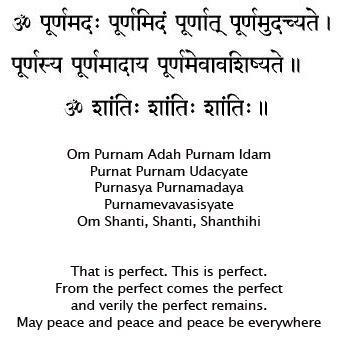
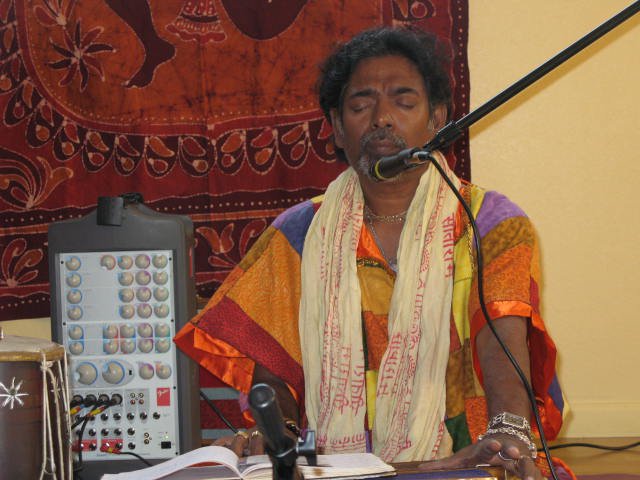
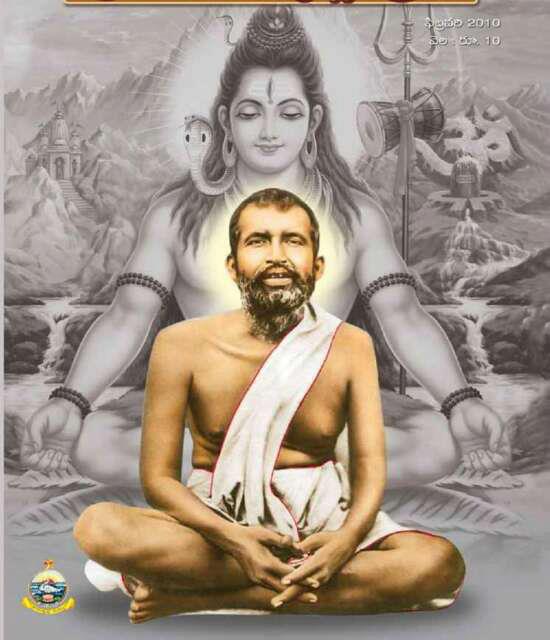

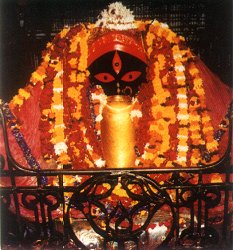
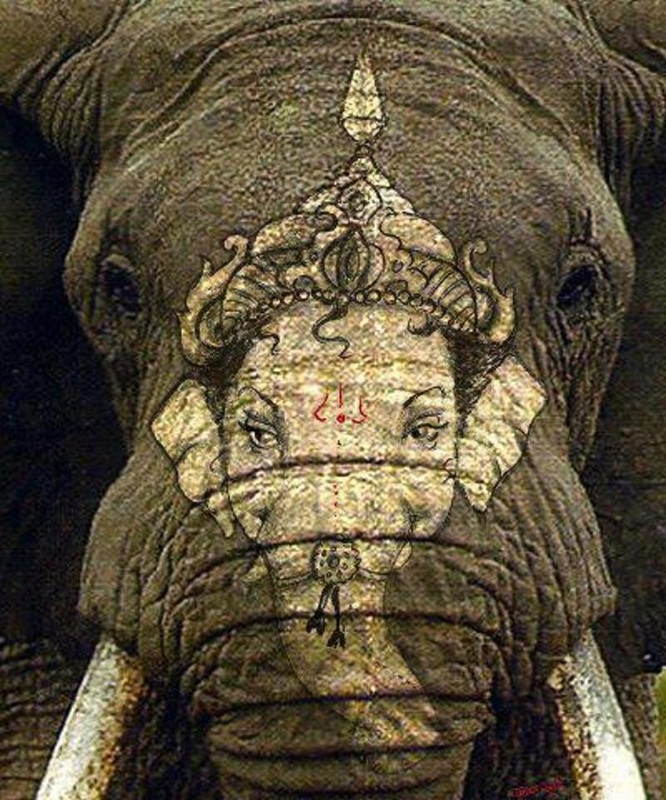
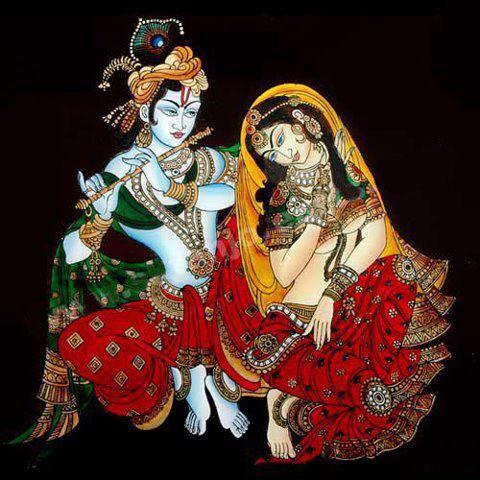
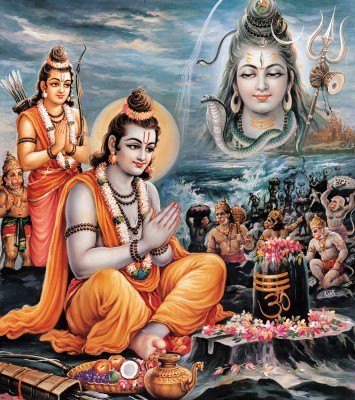
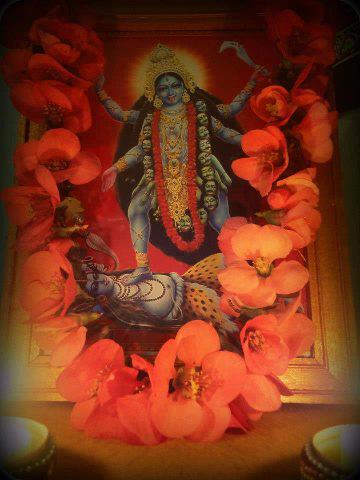
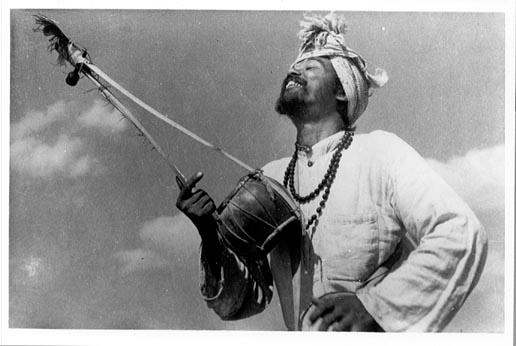
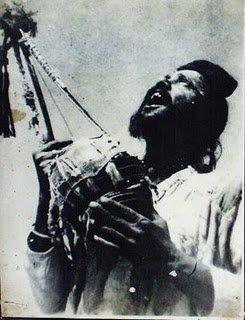
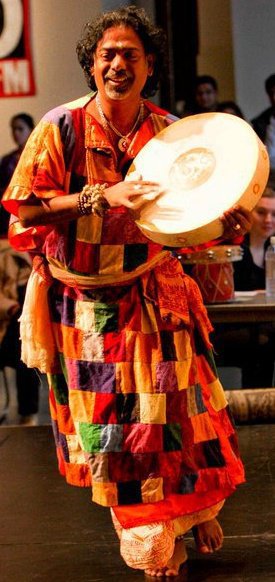
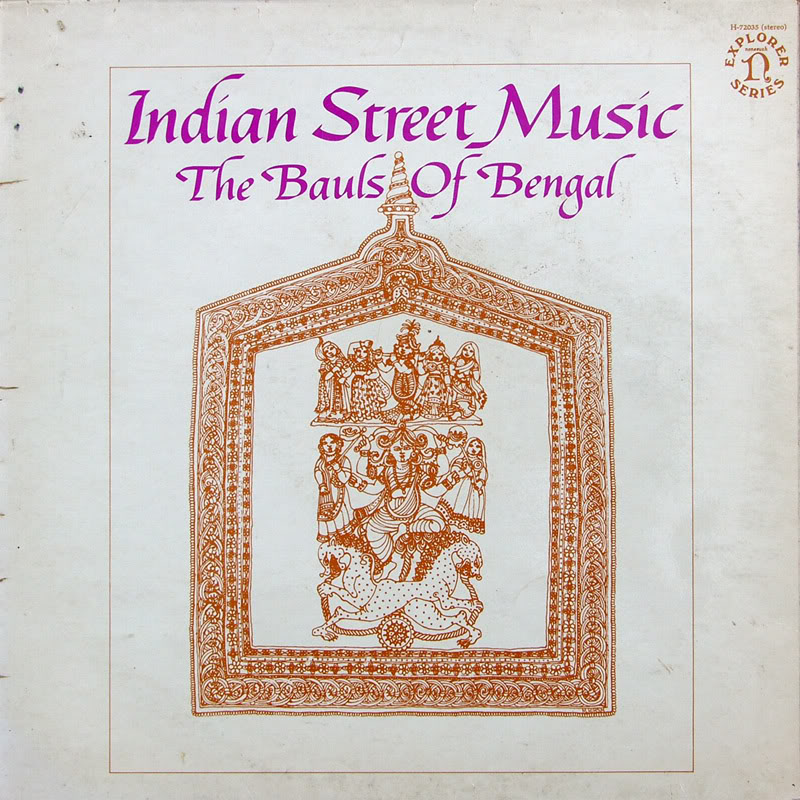
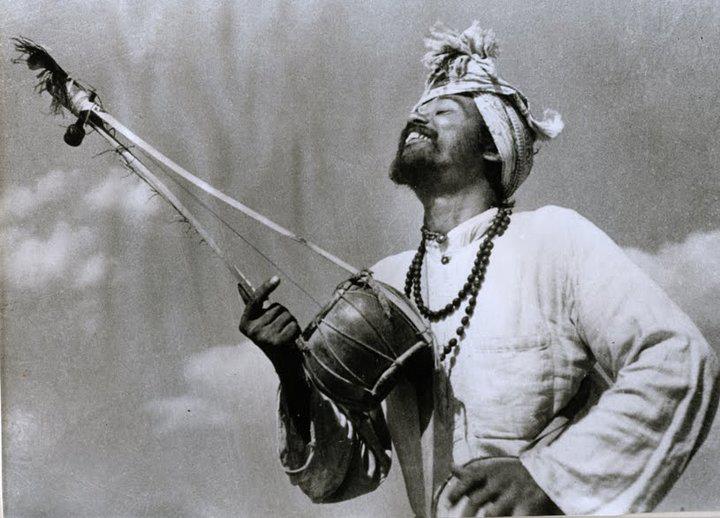
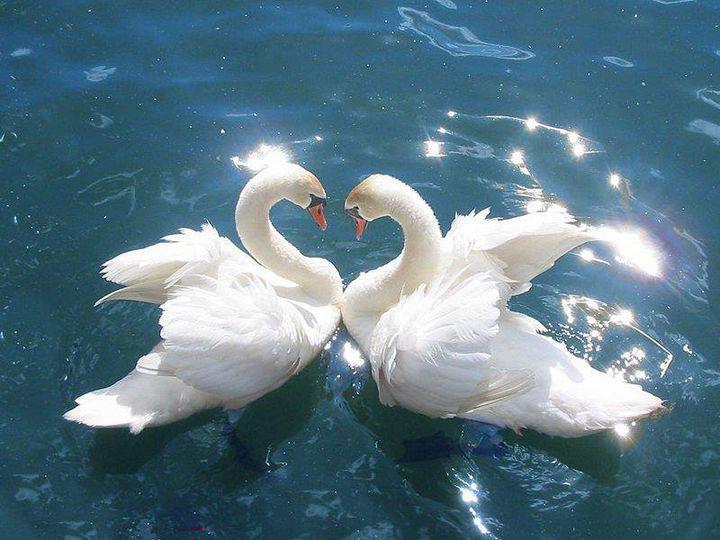
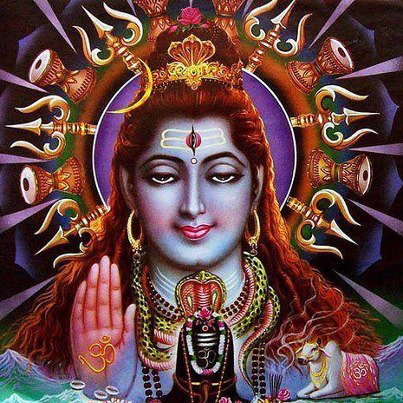
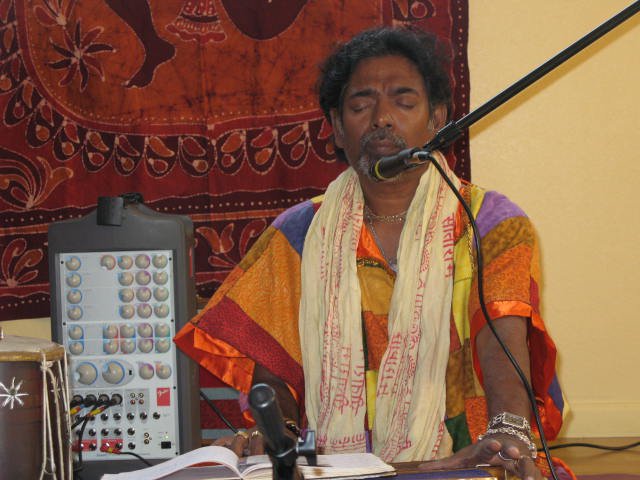
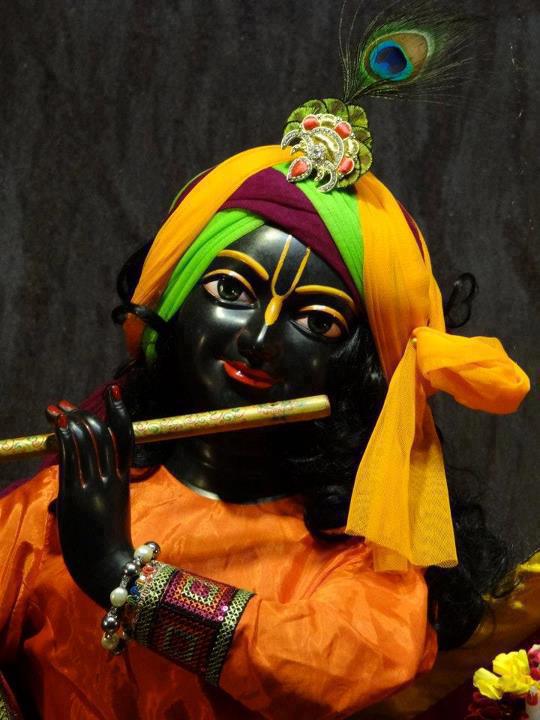
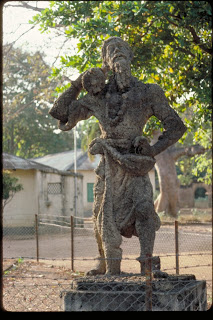
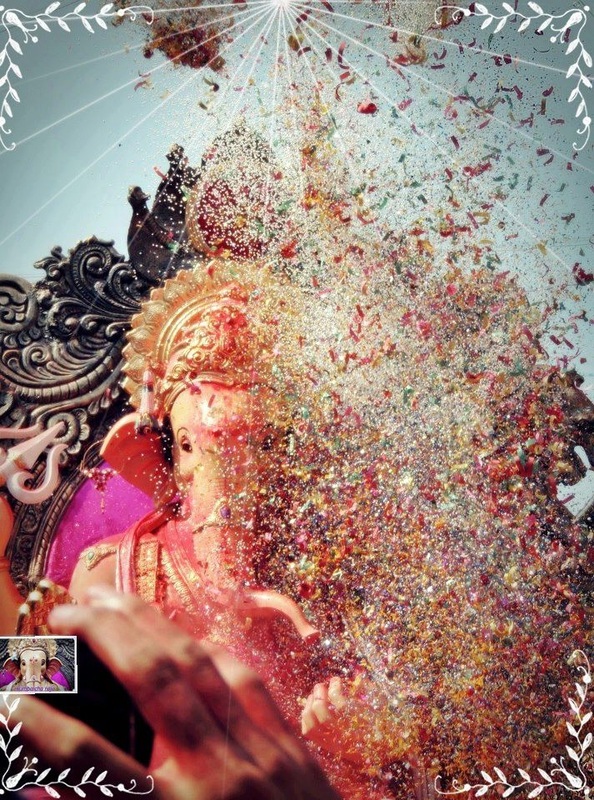
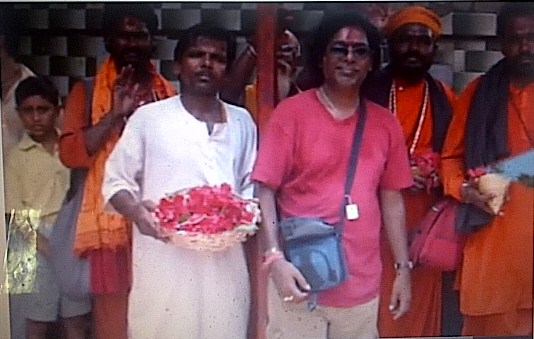
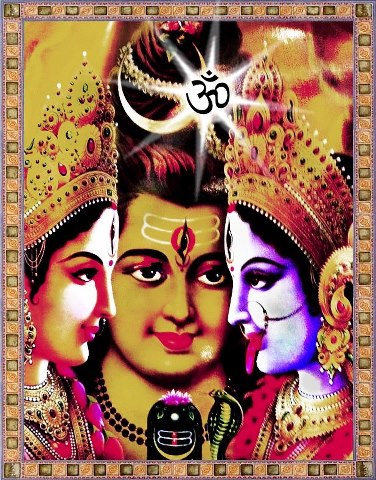
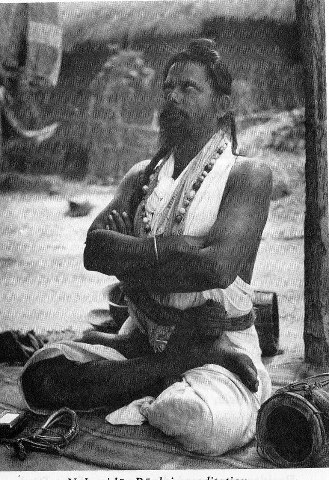
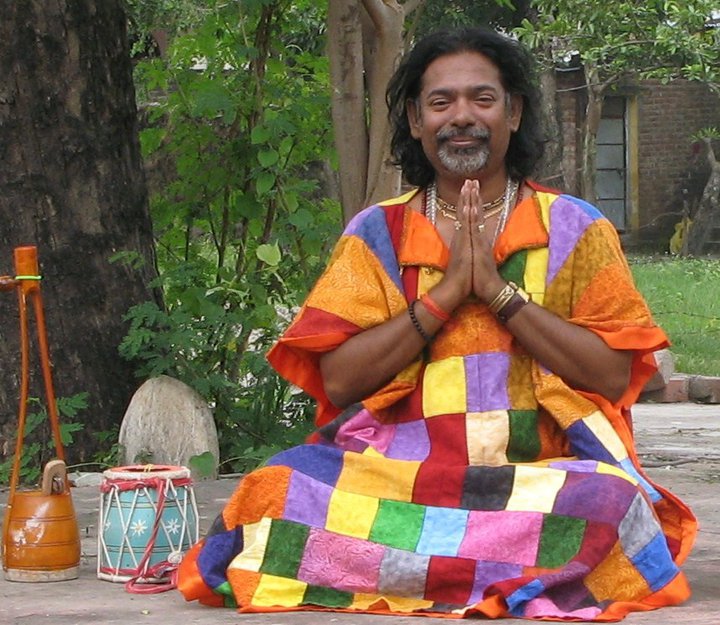
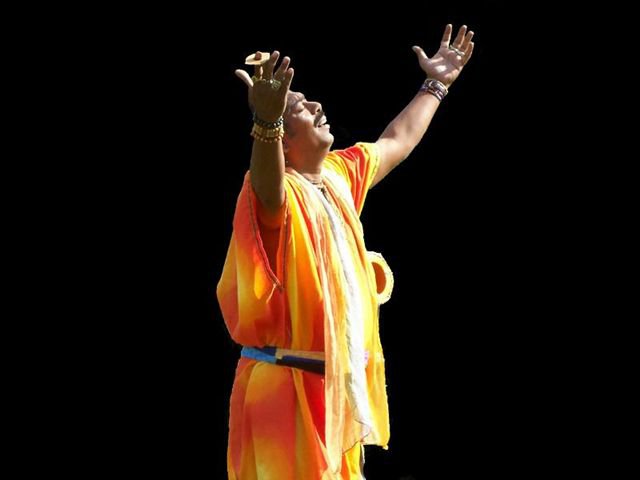
 RSS Feed
RSS Feed
